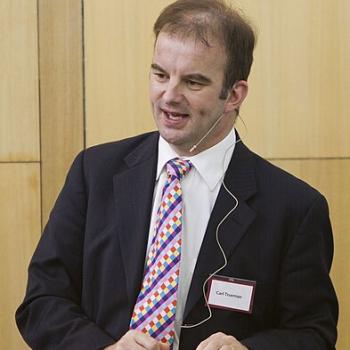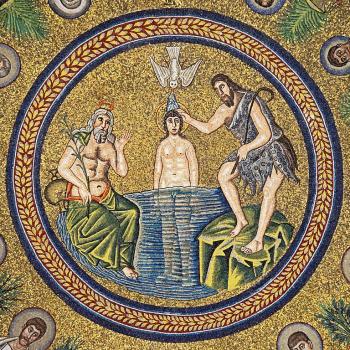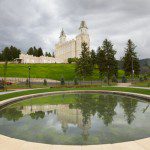I say: "Why were we born here? If this life is immaterial, then why weren't we just born in Heaven?" You ask people in the average congregation some of these questions and this leads people to see that this life and this Earth are gifts. We should approach these gifts with a grateful heart and not a feeling that it's all disposable! God is revealed in this Creation.
This is a good place to ask you to say a word about the Green Bible -- your first really big splash nationally, I would say. If people didn't know about Matthew Sleeth before that, then a whole lot of people met you through the Green Bible.
Well, the goal of the Green Bible was to produce a Bible that in some measure models sustainable printing. That Bible is produced with recycled content in the paper, which is unusual for a Bible. Then, in green ink, the Bible highlights verses similar to the ones I had underlined in my own earlier search through the Bible. Plus, the publishers collected a broad group of essays talking about these themes and included those in the Bible, too. That book has had a strong impact. Its first printing was 25,000 and sold out in a week's time, which the publisher didn't expect. It's convinced quite a number of people to start reading the Bible for the first time.
That Bible then led to this new book I've written for HarperOne: The Gospel According to the Earth, where I'm able to explore the themes that run through the Bible -- to do more than just highlight passages in green. I didn't want to leave people with just a kind of proof-texting approach to picking out individual verses. I wanted to help people see the larger themes that run throughout the whole Bible, so that's what I've done in this new book.
Well, I've read this new book and I can recommend it to readers, especially for small-group discussion. I can envision that Bible study groups, in particular, can really dig into this new book. You include some powerful, ancient themes in your book. Here's one example: Hospitality. You focus one whole chapter on this theme and how hospitality relates to caring for the Earth. Let me read a couple of lines from page 47: "Hospitality isn't about us. It's about others. It's about giving and expecting nothing in return. It's about using less so there will be enough for everyone. It's about being a good steward of resources so there will be plenty for all."
Hospitality is the reflex we need to cultivate as believers. Our society has more material things than perhaps any other culture in all of history. A new sense of community can only come through offering signs of hospitality to others. The Bible teaches us about this. Part of hospitality is becoming good stewards of resources so there is enough to share with others. And, Sabbath is part of good stewardship. We live in a society that has no restraint. We can't stop ourselves. We have no natural break built into our system of living.
This is a concept that's foreign to the modern church. I was in Nashville a few weeks ago, speaking mostly to an audience of college students. I asked them: "Who believes in the Ten Commandments?" Everybody indicated: Yes. Then, I asked: "How many of you remember the Sabbath and keep it holy?" I got about two hands from the whole audience. So, I said: "Basically, we've just subtracted that commandment." And, I tore the page right out of the Bible in front of them. You do that in front of a crowd of Christian students and that gets their attention!
Most people don't even see environmentalism as related to Sabbath, but it's right there in the Bible. When I talk, I ask people about these things. I ask: "How many of you say a prayer of thanks when you fill your gas tank? We say thanks when we eat dinner, at least on Thanksgiving in most homes. When we do that, we're acknowledging God's sustaining hand in our lives, so why don't all those things apply to the gas we're putting in our car?" Most people don't even think about expressing thanks for gasoline or cell phones or electricity that comes into our homes. We're just not even aware of these things. We feel we're entitled to all of it.
Do you feel discouraged? Or, do you hear a rising chorus of voices around you?
I don't feel like a solo voice at all. Maybe six years ago I felt that way, but I see wonderful things happening out there. I see a convergence in which people come at these issues in many different ways. And, people are listening. Think about this: I'm just a 53-year-old guy and I look like a square 53-year-old guy, but I find college students everywhere I go who are very excited about this work. I'm encouraged to see this next generation taking up their faith.
This article originally appeared at Read The Spirit and is reprinted with permission.
David Crumm is an author, journalist, and filmmaker with more than 20 years experience as a Religion Writer for the Detroit Free Press, Knight-Ridder newspapers, and Gannett. Crumm is now the Editor of Read The Spirit -- a new online home for important voices in religion and spirituality.




